八年级英语瞬间动词与延续性动词
英语短暂性动词和延续性动词
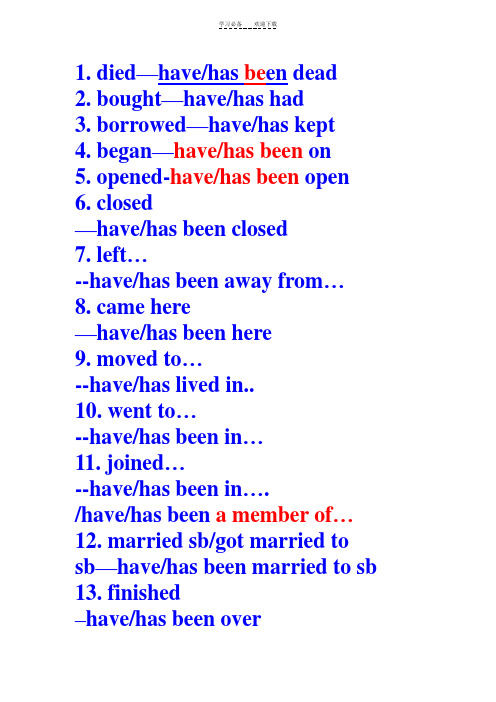
1. died—have/has be en dead2. bought—have/has had3. borrowed—have/has kept4. began—have/has been on5. opened-have/has been open6. closed—have/has been closed7. left…--have/has been away from…8. came here—have/has been here9. moved to…--have/has lived in..10. went to…--have/has been in…11. joined…--have/has been in…./have/has been a member of…12. married sb/got married to sb—have/has been married to sb 13. finished–have/has been over14. made/became friends—have/has been friends15. began to teach—have/has taught16. lose (lost)—haven’t/hasn’t had17.become (became)—have/has been ******************************* * He went to London in 1990. He is still in London now.→He has been in London since 1990. * I borrowed the book two weeks ago. →I have kept the book for two weeks/since two weeks ago.It is two weeks since I borrowed the book.●He joined the League two yearsago. = It is two years since hejoined the League.= He has been in the League for two years/ since two years ago.同义句(用两种方法变):1.The film began ten minutes ago. It is …since….It is ten minutes since the film began. The film has been on for ten minutes/since ten minutes ago.2.It is three days since he left.He left three days ago.He has been away from here for three days/since three days ago.3.He came here half an hour ago,and he is still here now.It is half an hour since he came here. He has been here for half an hour./since half an hour ago.4.Mary married Tom ten years ago. It is ten years since Mary married Tom.Mary has been married to Tom for ten years/since ten years ago.5.I began to teach English fourteenyears ago.It is fourteen years since I began to teach English.I have taught English for fourteen years/since fourteen years ago.I have been an English teacher for 14 years.Test in class1.He moved to Shenzhen two yearsago.It is two years since he moved to Shenzhen.He has lived in Shenzhen for two years/since two years ago.2.My father went to Shanghai lastweek.It is a week since my father went to Shanghai.My father has been in Shanghai since last week.3.Mike joined the army three yearsago.It is three years since Mike joined the army.Mike has been in the army for three years/since three years ago.4.It is ten minutes since the filmbegan.The film began ten minutes ago.The film has been on for ten minutes/since ten minutes ago.5.He bought the computer fourweeks ago.It is four weeks since he bought the computer.He has had the computer for four weeks/since four weeks ago.。
现在完成时中瞬间动词变延续性动词总结
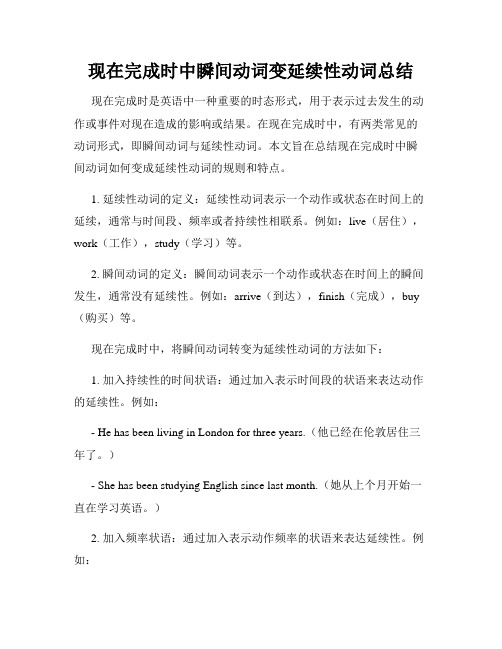
现在完成时中瞬间动词变延续性动词总结现在完成时是英语中一种重要的时态形式,用于表示过去发生的动作或事件对现在造成的影响或结果。
在现在完成时中,有两类常见的动词形式,即瞬间动词与延续性动词。
本文旨在总结现在完成时中瞬间动词如何变成延续性动词的规则和特点。
1. 延续性动词的定义:延续性动词表示一个动作或状态在时间上的延续,通常与时间段、频率或者持续性相联系。
例如:live(居住),work(工作),study(学习)等。
2. 瞬间动词的定义:瞬间动词表示一个动作或状态在时间上的瞬间发生,通常没有延续性。
例如:arrive(到达),finish(完成),buy (购买)等。
现在完成时中,将瞬间动词转变为延续性动词的方法如下:1. 加入持续性的时间状语:通过加入表示时间段的状语来表达动作的延续性。
例如:- He has been living in London for three years.(他已经在伦敦居住三年了。
)- She has been studying English since last month.(她从上个月开始一直在学习英语。
)2. 加入频率状语:通过加入表示动作频率的状语来表达延续性。
例如:- They have been playing tennis every weekend.(他们每个周末都在打网球。
)- I have been working out at the gym twice a week.(我每周在健身房锻炼两次。
)3. 加入表示动作状态的状语:通过加入表示动作状态的状语来表达延续性。
例如:- The team has been practicing hard for the upcoming tournament.(这个团队一直在为即将到来的比赛进行努力训练。
)- She has been studying diligently for her exams.(她为了考试一直努力学习。
初中英语短暂性动词转换为延续性动词
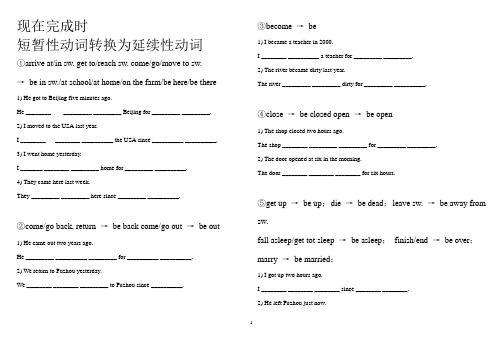
现在完成时短暂性动词转换为延续性动词①arrive at/in sw. get to/reach sw. come/go/move to sw.→be in sw./at school/at home/on the farm/be here/be there 1) He got to Beijing five minutes ago.He ________ _________ _________ Beijing for _________ _________.2) I moved to the USA last year.I ________ ________ __________ the USA since __________ __________.3) I went home yesterday.I _______ ________ _________ home for _________ __________.4) They came here last week.They _________ _________ here since _________ __________.②come/go back, return →be back come/go out →be out1) He came out two years ago.He _________ __________ _________ for __________ __________.2) We return to Fuzhou yesterday.We ________ ________ _________ to Fuzhou since __________. ③become →be1) I became a teacher in 2000.I ________ __________ a teacher for _________ _________.2) The river became dirty last year.The river _________ _________ dirty for _________ __________.④close →be closed open →be open1) The shop closed two hours ago.The shop ________ _________ _________ for _________ _________.2) The door opened at six in the morning.The door ________ ________ ________ for six hours.⑤get up →be up;die →be dead;leave sw. →be away from sw.fall asleep/get tot sleep →be asleep;finish/end →be over;marry →be married;1) I got up two hours ago.I ________ ________ ________ since ________ ________.2) He left Fuzhou just now.He _______ ________ ________ _________ Fuzhou for five minutes.3) My grandpa died in 2002.My grandpa _______ _______ ________for _______ ________.4) The meeting finished at six.The meeting ________ ______ ______ for six hours.5) I got to sleep two hours ago.I ________ _________ _________ since _________ _________.6) They married in 1990.They ________ _________ __________since _________.⑥start/begin to do sth. →do sth. ;begin →be on1) I began to teach at this school in 1995.I ____ ____ at this school since ____.2) The film began two minutes ago.The film ____ ____ ____ for ____ ____.⑦borrow →keep;lose →not have ;buy →have ;put on →wearcatch/get a cold →have a cold;get to know →know1) They borrowed it last week.They _________ _________ it since __________ __________. 2) I bought a pen two hours ago.I _________ _________ a pen for ________ __________.3) I got to know him last year.I _______ _______ him since __________ __________.4) I put on my glasses three years ago.I __________ __________ my glasses for _________ _________.⑧have/has gone to →have been inHe has gone to Beijing.He ____ ____ _____ Beijing for two days.⑨join the league/the Party/the army→be a league/a Party member/a soldier→be a member of the league/the Party→be in the league/the Party/the army1) He joined the league in 2002.He ________ _________ a _________ _________ for two years.He _______ _________ a __________ ___________ the __________ for two years. He ____________ ___________ ___________ the league for two years.2) My brother joined the army two years ago.My brother ________ __________ a ___________ for ___________ ___________. My brother __________ ___________ in ____________ ___________ for two years.。
短暂性动词于延续性动词在现在完成时中的应用

A.have been married
B. have married
C. married
D. has married
9. He ______ at eight yesterday afternoon. A. slept B. was sleeping C. has sleep D. had slept
常见的几个短暂性动词
.begin(start),leave,go, borrow,come,return. join,die,buy,arrive. marry,bec性动词可用来表示某一动作完成, 因此可用于现在完成时。
如: The train has arrived.火车到了。 Have you joined the computer group 你加入电脑小组了吗?
练习:
1. Do you know Huang Ting well
2.
yes,she and I ____ friends since we met in
Wuhan last summer.
3. A. have made B. were C. have been D. had come
4. Mr.Green ___Beijing since three years ago.
3.终止性动词可用于现在完成时否定 式中,成为可以延续的状态,因而 可与表示一段时间的状语连用。
如:
He hasn't left here since 1986.
I haven't heard from my father for two weeks.
延续性动词的用法
1.延续性动词可以用于现在完成时,其 完成时态可与表示“段时间”的状语 连用。表示“段时间”的短语有:for two years, during the past three years, since last year, how long等。如:
英语知识 _ 初中英语,延续性动词和瞬间性动词的用法

一、延续性动词延续性动词,表示的动作不但可以延续,而且可以产生持久的影响。
常见的这类动词有:b e,h a v e,ke e p,k n o w,l e a r n,l i e,l i v e,re a d,s i n g,s l e e p,s t a n d,s t a y,w a i t,w a l k,w a tc h等。
延续性动词的用法很广,但常见于现在完成时中的句子中,且常与f o r,h o w,l o n g,s i n c e 等引导的表示一段时间的状语或状语从句连用。
例如:I h a v e l e a r n e d m o re t h a n1000C h i n e s e w o rd s s i n c e I c a m e t o C h i n a.自从来到中国,我已经学会了l千多个汉字。
I h a v e ke p t t h e p i c t u re f o r a b o u t t h re e y e a r s.。
这张画我保存了大约三年二、瞬间性动词瞬间性动词,又称为终止性动词或非延续性动词,它表示的动作不能延续,也就是说动作一旦发生就立即结束,并产生某种结果。
常见的这类动词有:a c c e p t,a r r i v e,b ec o m e,b e g i n,b o r ro w,b re a k,b u y,c a tc h,c l o s e,c o m e,d i e,e n d,f a l l,f i n i s h,g e t,g i v e,g o,j o i n,l e a v e,p u t,re a c h,re c e i v e,sh u t,s t a r t,s t o p等。
用在现在完成时要注意下面三点:①瞬间性动词可直接用来表示某一动作的完成。
例如:T h e y h a v e re a c h e d S h a n g h a i.他们已经到达了上海。
英语人教版八年级下册现在完成时中延续性动词和短暂性动词的用法
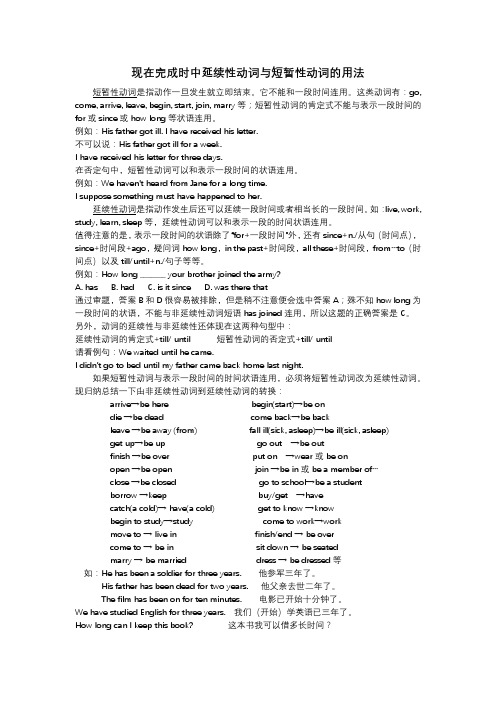
现在完成时中延续性动词与短暂性动词的用法短暂性动词是指动作一旦发生就立即结束。
它不能和一段时间连用。
这类动词有:go, come, arrive, leave, begin, start, join, marry等;短暂性动词的肯定式不能与表示一段时间的for或since或how long等状语连用。
例如:His father got ill. I have received his letter.不可以说:His father got ill for a week.I have received his letter for three days.在否定句中,短暂性动词可以和表示一段时间的状语连用。
例如:We haven’t heard from Jane for a long time.I suppose something must have happened to her.延续性动词是指动作发生后还可以延续一段时间或者相当长的一段时间。
如:live, work, study, learn, sleep等,延续性动词可以和表示一段的时间状语连用。
值得注意的是,表示一段时间的状语除了“for+一段时间”外,还有since+n./从句(时间点),since+时间段+ago,疑问词how long,in the past+时间段,all these+时间段,from…to(时间点)以及till/until+n./句子等等。
例如:How long _______ your brother joined the army?A. hasB. hadC. is it sinceD. was there that通过审题,答案B和D很容易被排除,但是稍不注意便会选中答案A;殊不知how long为一段时间的状语,不能与非延续性动词短语has joined连用,所以这题的正确答案是C。
另外,动词的延续性与非延续性还体现在这两种句型中:延续性动词的肯定式+till/ until 短暂性动词的否定式+till/ until请看例句:We waited until he came.I didn’t go to bed until my father came back home last night.如果短暂性动词与表示一段时间的时间状语连用,必须将短暂性动词改为延续性动词。
中考英语语法专项复习16时态中的短暂性动词和延续性动词

They _____ _____ _____ China _____ ten years.
They _____ _____ _____ China _____ ten years ago.
②、转换成 be﹢名词;
join the Party/club ------ be a Party/club member, join the army ------ be a soldier, go to school ------ be a student.
fall asleep ------ be asleep.
turn on/off------be on/off
6. The film began ten minutes ago. The film for .
ห้องสมุดไป่ตู้The film
since
.
7.My father left America last week.
9. His grandfather died five years ago.
five days ago. five days.
2. My father bought a new car two years ago. My father _____ _____ a new car _____ two years. My father _____ _____ a new car _____ two years ago.
时态中的 短 暂 性 和
延 续 性 动 词
动
词
短暂性动词也称做终止性动词、非延续性动词 或瞬间动词,表示动作不能延续,只是一瞬间就 结束的动作.
常见的短暂性动词有: come, go, arrive, reach, see,
短暂性动词转化为延续性动词的记忆口诀方法
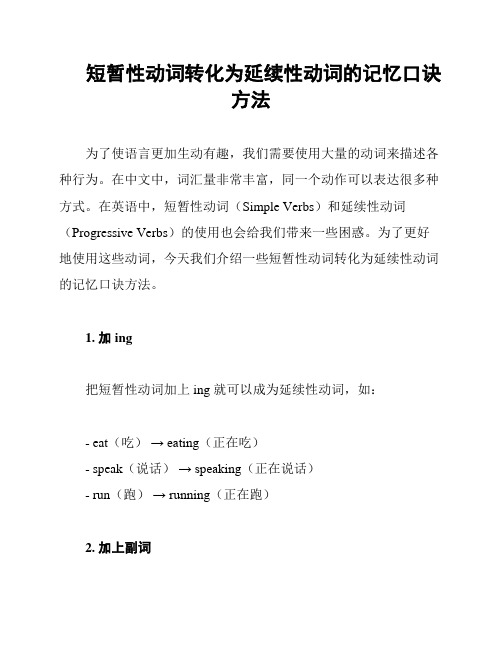
短暂性动词转化为延续性动词的记忆口诀
方法
为了使语言更加生动有趣,我们需要使用大量的动词来描述各种行为。
在中文中,词汇量非常丰富,同一个动作可以表达很多种方式。
在英语中,短暂性动词(Simple Verbs)和延续性动词(Progressive Verbs)的使用也会给我们带来一些困惑。
为了更好地使用这些动词,今天我们介绍一些短暂性动词转化为延续性动词的记忆口诀方法。
1. 加 ing
把短暂性动词加上 ing 就可以成为延续性动词,如:
- eat(吃)→ eating(正在吃)
- speak(说话)→ speaking(正在说话)
- run(跑)→ running(正在跑)
2. 加上副词
有些短暂性动词虽然不能直接加上 ing,但加上一些副词却可
以变成延续性动词,如:
- work(工作)→ work hard(努力工作)
- drive(开车)→ drive slowly(慢慢开车)
- walk(步行)→ walk quickly(快速行走)
3. 加上一些介词短语
通过加上一些介词短语也可以将短暂性动词转化为延续性动词,如:
- talk(交谈)→ ta lk about politics(谈论政治)
- wait(等待)→ wait for the bus(等待公交车)
- smile(微笑)→ smile at her(对她微笑)
使用记忆口诀方法可以更快地掌握英语动词的使用技巧,提高
我们的语言运用能力。
希望以上介绍的方法可以对大家的学习有所
帮助。
- 1、下载文档前请自行甄别文档内容的完整性,平台不提供额外的编辑、内容补充、找答案等附加服务。
- 2、"仅部分预览"的文档,不可在线预览部分如存在完整性等问题,可反馈申请退款(可完整预览的文档不适用该条件!)。
- 3、如文档侵犯您的权益,请联系客服反馈,我们会尽快为您处理(人工客服工作时间:9:00-18:30)。
将下列句子变为现在完成时
• 1.He got to Beijing five days ago. He _____ ______ ______ Beijing for ______ days ______. has been in five • 2.I became a teacher in 2000. • I ______ been ________ a teacher for _______ _______. has eleven years • 3.The shop closed two hours ago. has been two hours • The shop ______ _______ closed for _______ ______. ______ • 4.He left Fuzhou just now. • He _____ ______ ______ _______ Fuzhou for five has been away from minutes. • 5.They borrowed it last week. have a week • They ________had / kept it for ________ _________. _______
划线提问
• • • • • • • • • • 1) I have been there for two days. ______ long have How ______ ______ you _______ _______ ? been there 2) My father has lived here since 2000. How long ______ your father ______ _______? lived here _____ _____ has 3) He left here yesterday. When leave here _________did ________ he ________ _________? 4) They bought a book two hours ago. When did buy __________ ___________ they __________ a book? 5. He has been there twice. (划线提问) How many _______ _______ times _______ he been there? _____ has
• • • • • • • • • •
6) They married in 1991. have been married 1991 They ______ _______ ________since _______. 7) He got to Beijing five minutes ago. He ______ ______ _______ Beijing for ______ ______. has been in five minutes 8) I bought a pen two hours ago. have kept two hours I _______ _______ a pen for ______ ________. 9) They came here last week. have _______ here since _______ ________. last week They _______ been 10) I became a teacher in 2000. have ________ a teacher for _______ _______. I ______been eleven years
延续性动词
• 也叫可持续性动词。表示动作的完成可以持续一 段时间。 • 常见的延续性动词:work, live, stay, teach, study, run, read, write等。
• They have studied English for 8 years.
• 1. He has died for three years. • 2. He has been dead for three years. • 哪个正确? • 句1中die表示的是死这个动作,而死这个动作是非 延续的,不可能持续三年;而句2中用be dead这个 表示状态的,将非延续性动词进行了转化。
• 11) The river became dirty last year. • The river ______ _____ dirty for _____year has been a _____. • 12) My brother joined the army two years ago. • My brother ______been _______ in _______ army ______ for has the two years. • 13) I began to teach at this school in 1995. have ____ • I ____ taught at this school since 1995 ____. • 14) They borrowed it last week. have last • They _______ kept _______ it since ________week ________. • 15) I got to know him last year. have known last year • I _______ _______ him since _______ ________. • 16) He joined the league in 2009. has been league member • He ______ _______ a _______ _______ for two years. • He _______ _______ ______ the League for two has been in years.
延续性动词
be dead keep/have have be up be in be away (from) be out be back be over be married
• • • • • • • • • • • • •
open → be open close → be closed begin /start → be on begin to study →study get to know →know join → be in 或 be a member of… reach get to → be in + 地点 arrive in/at put on →wear 或be on fall ill (asleep) → be ill (asleep) become interested in → be interested in 不要忘记把转换过的动词变为过去分词
瞬间动词
• 表示动作的完成只是在瞬间,并不能持续一段时 间,这样的动词便是瞬间动词。 • 常见瞬间动词:die, borrow, buy, get up, come, leave,
finish, open, close, get to, reach, join
• 这些动词不能用在完成时中与段时间状语(since 、 for)连用。
短暂性动词转换为延续性动词
• • • • • • • • • • 1) The shop closed two hours ago. has _____ ______ for _______ ______. two hours The shop _____been closed 2) The door opened at six in the morning. has been open The door _______ _______ _______ for six hours. 3) He left Fuzhou just now. has been from He _____ ______ away ______ _______ Fuzhou for five minutes. 4) My grandpa died in 2001. has _____ ______for ______ ______. ten years My grandpa _____ been dead 5) The meeting finished at six. has been The meeting ________ ______over ______ for six hours.
现在完成时中的 瞬间动词与延续性动词
完成时中,肯定句,疑问句中谓语动词必须是延续性动词 1)I‘ve lived here since 1990.(自从1990年以来我就住在这里) = I've lived here for 21 years. 2)Mr Wang has worked in the factory since he came to the city . (自从到这个城市以来,王先生一直在这家工厂工作) ( ) 注意:在这类句子的肯定句和疑问句中谓语动词必须用延续性 动词。短暂性动词由于动作不能持续,故不能与for或since引 出的时间状语连用。 但是 I haven't seen him for three years .我三年没有看见他 了
• 结论:非延续性动词(即瞬间动词)不能用在完成
时中与表示段时间的for……和since……连用,而要 进行转化。
瞬间动词向延续性动词的转化
• 短暂性动词
• • • • • • • • • • die → borrow → buy → get up → come → leave → go out → come back → finish → Marry ----
用过去时或现在完成时填空:
• • • • •
